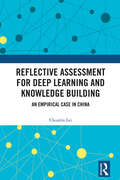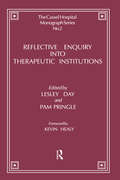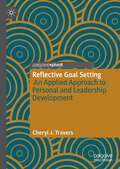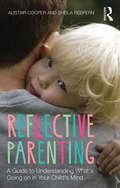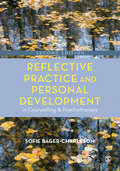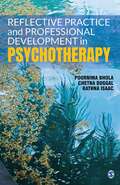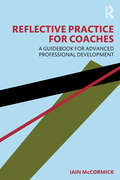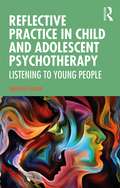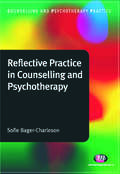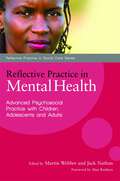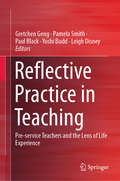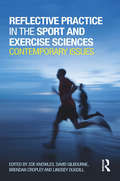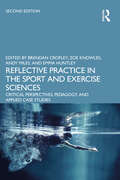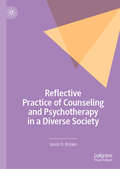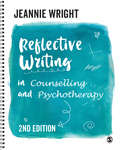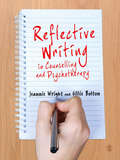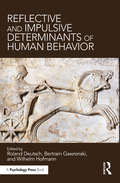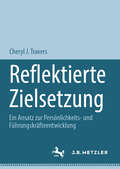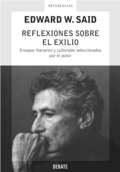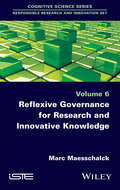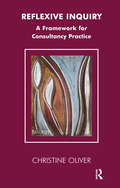- Table View
- List View
Reflective Assessment for Deep Learning and Knowledge Building: An Empirical Case in China
by Chunlin LeiKnowledge building aims to transform schools into learning communities and bring knowledge creation into schools. The book therefore elaborates on how learning, technology, and assessment can be aligned both online and offline to facilitate such a process.Adopting a quasi-experimental design and drawing on rich data from forum discussions, questionnaires, interviews, learning outcomes, and classroom presentations, this book shows that the knowledge building environment, augmented by reflective assessment and principles, helped Chinese students to develop a deeper approach to learning, improved academic performance, and promoted collective knowledge advances. The book also discusses the potentials and challenges of designing technology-supported, assessment- and principle-based learning environments in tertiary contexts, especially when deep learning and knowledge building capacity are greatly emphasised in the knowledge era.The book will be of interest to scholars and educators working in learning sciences and computer-supported collaborative learning.
Reflective Enquiry into Therapeutic Institutions (The\cassel Hospital Monograph Ser.)
by David Bell R. D. Hinshelwood Wilhelm Skogstad Lesley Day Peter Griffiths Kevin Healy Pamela Pringle Agata Pisula Tom MainTherapeutic practice needs constant examination to ensure that it remains responsive and dynamic. Living organisms must communicate with their environment if they are to survive, and institutions are no different. This monograph, the second of the Cassell Hospital series, explores this concept further. By reading it, ideas and thinking will be sparked off that will help other organisations promote their own culture of enquiry.- Kevin Healy, Director of the Cassel Hospital, from his Foreword. The contemporary Cassel Hospital was developed by Tom Main to create a self-exploratory institution. Main argued that, in order for the hospital to be therapeutic, it needs a "culture of enquiry". The individual and the institution might be seduced into ritualised working practices that no longer serve the needs of patients or staff. It is these "lapses from the continual enquiry" that are considered by this collection. It describes the mostly unconscious manoeuvres that inhibit reflection, and how the inappropriate use of psychoanalytic ideas can close off enquiry within a therapeutic community.
Reflective Goal Setting: An Applied Approach to Personal and Leadership Development
by Cheryl J. TraversThis book presents, for the first time, a comprehensive overview of the Reflective Goal Setting model, its theoretical framework and origins, and its practical applications for personal development, improved coping and reduced stress, academic growth and performance and leadership.Divided into three parts, the author begins by examining the particular importance of personal development, and in particular soft and interpersonal skills development. It addresses the limitations of current personal development and leadership education and training for the transfer of learning, before outlining how Reflective Goal Setting fulfils this need. It presents a critical review of Goal Setting Theory and approaches to reflective practice that demonstrates how the Reflective Goal Setting model was developed from, and builds upon, these earlier approaches. Drawing on original research and illustrative case studies, the author details the cyclical five step process of the Reflective Goal Setting model across 5 chapters - forming Part 2 of the book. Part 3 examines the practical applications and impact of using Reflective Goal Setting, employing illustrative case studies from a variety of settings including higher education, professional development and executive education.This innovative work will provide a valuable resource for researchers and practitioners in Organisational and Industrial Psychology, Education, and Business and Management and indeed anyone who wants to work on their own personal development.
Reflective Parenting: A Guide to Understanding What's Going on in Your Child's Mind
by Alistair Cooper Sheila RedfernHave you ever wondered what's going on in your child's mind? This engaging book shows how reflective parenting can help you understand your children, manage their behaviour and build your relationship and connection with them. It is filled with practical advice showing how recent developments in mentalization, attachment and neuroscience have transformed our understanding of the parent-child relationship and can bring meaningful change to your own family relationships. Alistair Cooper and Sheila Redfern show you how to make a positive impact on your relationship with your child, starting from the development of the baby's first relationship with you as parents, to how you can be more reflective in relationships with toddlers, children and young people. Using everyday examples, the authors provide you with practical strategies to develop a more reflective style of parenting and how to use this approach in everyday interactions to help your child achieve their full potential in their development; cognitively, emotionally and behaviourally. Reflective Parenting is an informative and enriching read for parents, written to help parents form a better relationship with their children. It is also an essential resource for clinicians working with children, young people and families to support them in managing the dynamics of the child-parent relationship. This is a book that every parent needs to read.
Reflective Practice and Personal Development in Counselling and Psychotherapy (Counselling and Psychotherapy Practice Series)
by Sofie Bager-CharlesonReflective practice is a vital part of your counselling and psychotherapy training and practice. This book is your go-to introduction to what it is, why it is important, and how to use different models for reflection and reflective practice to enhance your work with clients. It will support your personal development and professional development throughout your counselling training and into your practice.
Reflective Practice and Personal Development in Counselling and Psychotherapy (Counselling and Psychotherapy Practice Series)
by Sofie Bager-CharlesonReflective practice is a vital part of your counselling and psychotherapy training and practice. This book is your go-to introduction to what it is, why it is important, and how to use different models for reflection and reflective practice to enhance your work with clients. It will support your personal development and professional development throughout your counselling training and into your practice.
Reflective Practice and Professional Development in Psychotherapy
by Poornima Bhola Chetna Duggal Rathna IsaacReflective Practice and Professional Development in Psychotherapy presents reflection as a tool to further self-exploration and aid professional development for psychotherapists and counsellors. It discusses the potential avenues, methods and spaces for self-reflective work. The book extensively cites both global and Indian research and presents therapist voices and perspectives, accompanied with self-reflective exercises and experiential activities. It highlights how the intersectional lens and diversity perspective can be integrated in reflective practice, especially for practitioners in India. The objective is to help the reader use reflection to critically examine, personalize and ‘own’ ideas that can nurture personal and professional growth. The book is indispensable for therapists at all levels of development and an important read for academicians, practitioners, trainers and supervisors from the disciplines of clinical and counselling psychology, social work and psychiatry.
Reflective Practice for Coaches: A Guidebook for Advanced Professional Development
by Iain McCormickThis practical evidence-based guide to running Reflective Practice professional development programmes provides a dynamic and engaging resource for a wide range of coaches. Reflective Practice is a proven learning and development approach that involves consciously and deliberately thinking about experiences to develop insights and apply these within coaching practice. McCormick argues that it is vital that coaches regularly reflect on their work to develop and grow professionally, and this book provides a definitive and rich source of material on how and what to reflect on. Topics include how to reflect as an individual coach; working in pairs and small groups; applying reflective practice in a training context; and how to run advanced group sessions for coaches. The book features a wide range of practical workbook exercises to challenge the reader’s current practice and extend their capability, as well as an evidence-based guide to enhancing skills in recently developed areas such as Unified Protocol Cognitive Behavioural Therapy, Internet Supplemented Acceptance and Commitment Therapy, and Using Schema Therapy with Mindfulness Techniques. Written by a highly experienced executive coach, this book is full of practical and effective ways to become more capable and proficient. It is essential reading for any career, life or executive coach who wishes to enhance their coaching capability through reflective practice, as well as for coaching training organisations, senior executive coaches offering sessions for other coaches, and academic institutions offering coaching qualifications.
Reflective Practice in Child and Adolescent Psychotherapy: Listening to Young People
by Jeanine ConnorTherapy referrals for a child or young person can be motivated for a number of reasons. The parents, carers or professionals responsible for their wellbeing might describe a sudden change in presentation, risk taking behaviour, such as self-harm or experimentation with drugs, alcohol or sex, or they might label the young person as over reacting, under reacting or attention seeking. Such behaviour prompts concern for their safety and confusion about why the child or young person is presenting the way they are. This book offers a thoughtful approach to making sense of such behaviour and encourages adults to ‘reflect on’ rather than ‘react to’ young peoples’ outward presentations. Based on the author’s work with children, young people and families over two decades, this book shares reflections from the therapy room and illustrates how the therapist can try to make sense of mood, behaviour and presentations that previously made no sense. The content relies heavily on clinical experience as well as drawing on classical and contemporary psychotherapeutic literature. So often adults find themselves reacting to observable behaviour in a judgmental or punitive way, rather than pausing to consider what the behaviour might be communicating. The author aims to model a thoughtful reflective approach to making sense of what might be going on for children and young people and this book will be of great interest to child and adolescent psychotherapists, related professionals and those with an interest in young persons’ mental health.
Reflective Practice in Counselling and Psychotherapy (Counselling and Psychotherapy Practice Series)
by Sofie Bager-CharlesonA good understanding of reflective practice is essential for good practice in counselling and psychotherapy, and is a criterion for accreditation with the British Association for Counselling and Psychotherapy. This book takes students on a step-by-step journey through the history of reflective practice, from its origins with Donald Schon through to ideas of knowledge and power and how the counsellor or psychotherapist deals with issues surrounding the 'self'. A central theme of the book is the concept of self-reflection and what motivates a therapist to do an often difficult and sometimes emotionally complex job.
Reflective Practice in Nursing
by Mrs Lioba Howatson-JonesReflection enables us to make sense of, and learn from, experiences that can seem uncertain, chaotic or even mundane. It is a core skill that student nurses must grasp to develop professionally, and is a requirement of the professional standards. This book introduces student nurses to reflection in a clear and practical manner. It shows different ways of using reflection to learn and develop as a practitioner, including exploring personal experiences. It gives practical tips on using reflection throughout the pre-registration programme and empowers the student nurse to take ownership of their own learning by developing this important skill.
Reflective Practice in Teaching: Pre-service Teachers and the Lens of Life Experience (Reflective Teaching Ser.)
by Gretchen Geng Pamela Smith Paul Black Yoshi Budd Leigh DisneyThis book investigates the ways in which pre-service teachers develop and articulate their professional knowledge by presenting their reflections on contemporary issues and topics they have explored during their own teaching practicums. It uses reflective practice to connect pre-service teachers’ personal backgrounds with their placement experience concerning a self-selected topic, including teacher educators’ reflections on the pre-service teachers’ reports on these placement topics. By illustrating the broad range of issues encountered by pre-service teachers, sharing multiple perspectives on the complexity of classroom practice, and demonstrating the importance of reflective practice, it also provides a valuable mentoring framework. Moreover, the book studies how examining pre-service teachers’ life experience can facilitate in-depth understanding, specifically in the context of pre-service teachers’ reflections on their own practices in different educational settings. In short, the book helps current and prospective pre-service teachers and teacher educators get to know their students and themselves better using reflective practice.
Reflective Practice in the Sport and Exercise Sciences: Contemporary issues
by Zoe Knowles David Gilbourne Brendan Cropley Lindsey DugdillDrawing on the experiences of scientists, researchers, practitioners and teachers in a wide range of sport and exercise settings, this book explores contemporary issues in reflective practice and considers the way that reflective practice impacts upon applied practice, on research methodology and on professional development. It includes chapters on the use of reflective practice in areas as diverse as: delivering coach education sport psychology support working in sports physiology developing young players in sport exercise-related interventions physiotherapy working inside a professional football club student skills and the physical activity and health curriculum Based on multi-disciplinary work in education and the health sciences, and exploring the crucial interface between learning and practice, this book is important reading for all sport and exercise scientists and any professional working in sport and exercise looking to become more effective practitioners.
Reflective Practice in the Sport and Exercise Sciences: Critical Perspectives, Pedagogy, and Applied Case Studies
by Zoe Knowles Brendan Cropley Andy Miles Emma HuntleyWithin the Sport and Exercise Sciences (SES) and allied disciplines, reflective practice has become firmly established as a fundamental aspect of education, professional training and development, and applied service delivery. This has resulted in an emerging, context-specific evidence base that has attempted to make sense of the application and utility of reflective practice as a mechanism to facilitate personal and professional growth through experiential learning, and subsequently develop the knowledge required to navigate the complexities of applied practice. This new and fully revised edition of Reflective Practice in the Sport and Exercise Sciences explores the contemporary conceptual landscape, critical perspectives, pedagogy, and applied considerations in reflective practice in the SES and allied disciplines. Contributions from scientists, researchers, practitioners, and academics offer innovative perspectives of reflective practice, founded on a synthesis of the contemporary empirical evidence base and applied practitioner experience. These contributions challenge academic and/or practice-based audiences regarding the utility, research, and representation of reflective practice, while offering critical insights into the application of different approaches to reflective practice. Based on exploring the crucial interface between learning and practice, this book is important reading for all who work in the SES and allied disciplines, and, more widely, any professional aiming to become a more effective practitioner. This book is endorsed by the British Association of Sport and Exercise Sciences.
Reflective Practice of Counseling and Psychotherapy in a Diverse Society
by Jason D. BrownThis book is a guide to critical reflective practice that highlights cultural differences and their impact on the therapeutic relationship. It is designed for therapists in training as well as more experienced practitioners. The book addresses important topics such as power and privilege in relation to class and race, gender and sex, (dis)ability and age. Readers are encouraged to respond to questions about their values and beliefs, worldviews and ideologies, and assumptions about theories of change, as well as their own heath and healing process.
Reflective Thinking in Educational Settings
by Alessandro Antonietti Emanuela Confalonieri Antonella Marchetti Alessandro Antonietti Emanuela ConfalonieriThis volume examines the role that culture plays in the acquisition of cognitive, linguistic, and social skills. Taking reflective thinking as a central analytical concept, the contributors investigate the role of personal reflection in a series of mental activities, including the creation of social relationships, the creation of a mental narrative to make sense of events, and metacognition. These three types of cognition are usually conceived of as separate research fields. Metarepresentation and Narrative in Educational Settings draws these discrete subfields into dialogue, exploring the connections and interplay among them. This approach yields insight into a range of topics, including language acquisition, cognitive processes, Theory of Mind, cross-cultural interaction, and social development. The volume also outlines the implications of these findings in terms of further research and possible social policy initiatives.
Reflective Writing in Counselling and Psychotherapy
by Jeannie WrightIn this book Jeannie Wright takes readers on a journey from how to start writing, through the various approaches, on to how to deal with obstacles, and how to maintain reflective enquiry as a professional habit. Reflective writing exercises, case studies and ideas for self-directed learning will help readers practice and apply their skills. This second edition includes more content on: the new Ethical Framework technological developments impacting counselling diversity and difference in the therapeutic relationship This book is an essential how-to guide for trainees and practitioners that provides them with all the tools they need to develop writing for reflective practice.
Reflective Writing in Counselling and Psychotherapy
by Jeannie WrightIn this book Jeannie Wright takes readers on a journey from how to start writing, through the various approaches, on to how to deal with obstacles, and how to maintain reflective enquiry as a professional habit. Reflective writing exercises, case studies and ideas for self-directed learning will help readers practice and apply their skills. This second edition includes more content on: the new Ethical Framework technological developments impacting counselling diversity and difference in the therapeutic relationship This book is an essential how-to guide for trainees and practitioners that provides them with all the tools they need to develop writing for reflective practice.
Reflective Writing in Counselling and Psychotherapy: Writing And Professional Development
by Gillie E Bolton Jeannie WrightHave you been asked to keep a personal development portfolio or reflective journal? Are you struggling to know where to start, how to write or what to include? If the answer is 'yes', this book will provide you with a straightforward route in, telling you all you need to know about writing reflectively for your own personal and professional development. Offering staged exercises, case-studies, examples and ideas for self-directed learning, this book will lead the reader along an exciting journey of written self-awareness, covering: - the background - what exactly is reflective writing and why is it important - the decisions - when and how to start - the practicalities - the essentials of writing reflectively - the stumbling blocks - dealing with obstacles and difficulties - the long haul - maintaining reflective enquiry as a lifelong habit This book is an essential how-to guide appropriate for all undergraduate and postgraduate trainees, whether they are approaching the topic from a psychodynamic, person-centred or CBT perspective. It will give trainees all the tools they need to become mature reflective practitioners. Jeannie Wright Director of Counselling and Psychotherapy Programmes at Warwick University. Gillie Bolton is a Freelance consultant in therapeutic & reflective practice writing and author of the bestselling Reflective Writing, 3rd Edition, SAGE 2010.
Reflective and Impulsive Determinants of Human Behavior
by Bertram Gawronski Wilhelm Hofmann Roland DeutschConflicts between the "head" and the "heart" are very common in everyday life. Over the past decade, research on such self-regulatory conflicts has been strongly shaped by Strack and Deutsch’s 2004 Reflective-Impulsive Model (RIM). The award-winning theory integrates cognitive, affective, and motivational influences on overt behavior, offering a domain-independent framework that is applicable to wide range of social and non-social phenomena. This book provides a state-of-the-art overview of research under the framework of the RIM. Its 15 chapters provide an overview of basic principles of behavior determination, showcase the RIM’s integrative and predictive power in many cross-cutting areas of inquiry, and illustrate the value of the theory for understanding the fundamental role of reflective and impulsive processes in various applied domains. Expanding on an introduction that discusses the significance of the RIM from a historical view, the book is divided into three major sections. The first section covers basic psychological principles within the RIM, including selective accessibility, embodiment, associative and propositional operations, and implementation intentions. The second section reviews the integrative and predictive power of the RIM in many cross-cutting areas of inquiry, including intuition, attitudes, self-control, and personality. Finally, the third section showcases the generative power of the RIM in various applied areas, including research on health behavior, addiction, anxiety, economic behavior, sexual behavior, and aggression. In its entirety, this volume provides an indispensable resource for any scholar interested in the psychological underpinnings of reflective and impulsive behavior in various areas of inquiry.
Reflektierte Zielsetzung: Ein Ansatz zur Persönlichkeits- und Führungskräfteentwicklung
by Cheryl J. TraversDieses Buch präsentiert erstmals einen umfassenden Überblick über das Modell des "Reflective Goal Setting", seinen theoretischen Rahmen und Ursprung sowie seine praktischen Anwendungen für die persönliche Entwicklung, verbesserte Bewältigung und Stressreduktion, akademisches Wachstum und Leistungsfähigkeit sowie Führung. In drei Teile gegliedert, untersucht die Autorin zunächst die besondere Bedeutung der persönlichen Entwicklung, insbesondere der Entwicklung von Soft Skills und zwischenmenschlichen Fähigkeiten. Unter Verwendung von Originalforschung und anschaulichen Fallstudien beschreibt die Autorin den zyklischen Fünf-Schritte-Prozess des "Reflective Goal Setting" in fünf Kapiteln, die Teil 2 des Buches bilden. Teil 3 untersucht die praktischen Anwendungen und Auswirkungen der Verwendung von "Reflective Goal Setting" anhand anschaulicher Fallstudien aus verschiedenen Bereichen, einschließlich Hochschulbildung, beruflicher Entwicklung und Führungskräfteentwicklung. Dieses Werk ist eine wertvolle Ressource für Forscher:innen und Praktiker:innen in den Bereichen Organisations- und Industriepsychologie, Bildung sowie Wirtschaft und Management sein - und für jede/n, der/die an der persönlichen Entwicklung arbeiten möchte.Die Übersetzung wurde mit Hilfe von künstlicher Intelligenz durchgeführt. Eine anschließende menschliche Überarbeitung erfolgte vor allem in Bezug auf den Inhalt.
Reflexiones sobre el exilio: Ensayos literarios y culturales seleccionados por el autor
by Edward W. SaidLa selección definitiva de los ensayos culturales y literarios de Edward W. Said realizada por el propio autor. Este libro reúne ensayos sobre temas culturales y literarios escritos por Edward W. Said a lo largo de tres décadas de intenso trabajo intelectual y político. Vistos en conjunto y con la perspectiva crítica que concede el tiempo, estos textos -seleccionados por el propio autor como compendio de su carrera humanista- nos ofrecen la oportunidad de contemplar la evolución y formación de un combativo profesor, un hombre de palabra y acción, así como el desarrollo de una vocación por el conocimiento del mundo llevada hasta sus últimas consecuencias. De sus reflexiones sobre la cultura popular, que le llevan a calificar a Tarzán de «exiliado permanente» o evocar la figura de la bailarina del vientre Tahia Carioca, al machismo y la tauromaquia de Hemingway, pasando por las diferencias que distinguen ciudades como Alejandría y El Cairo, o sus indispensables capítulos sobre música (Gould, Boulez, Wagner, Beethoven y Bach), el autor de Orientalismo expone en estos artículos su punto de vista inteligente y siempre contrario a la edificación de cánones literarios. Reseña:«El retrato de una vida intelectual ejemplar en la cual rigor y claridad se unen con coraje y compromiso [...] Esta es, con toda seguridad, una de las obras más importantes de la cultura y las humanidades que América ha producido en los últimos años.»Martha C. Nussbaum, The New York Times Book Review
Reflexive Governance for Research and Innovative Knowledge
by Marc MaesschalckThe governance theories that have developed over the past twenty years offer a new framework to consider and examine the collective conditions of a “Responsible Research and Innovation – RRI” linked up with the policy challenges of a society in transition in all its modes of regulation. This book will recall the genesis of the reflexive point of view in the context of the development of the theory of governance. It will then develop the strengths of the model and finally, will show the fruitfulness of its application to the field of the RRI.
Reflexive Inquiry: A Framework for Consultancy Practice (The Systemic Thinking and Practice Series)
by Christine OliverThis book sets out to explain how the reflexive inquiry model can be adapted to research so that consultants can continue to evaluate their work and learn from the process. It draws out some implications of the principles, arguments, models, and tools presented for undertaking research.
